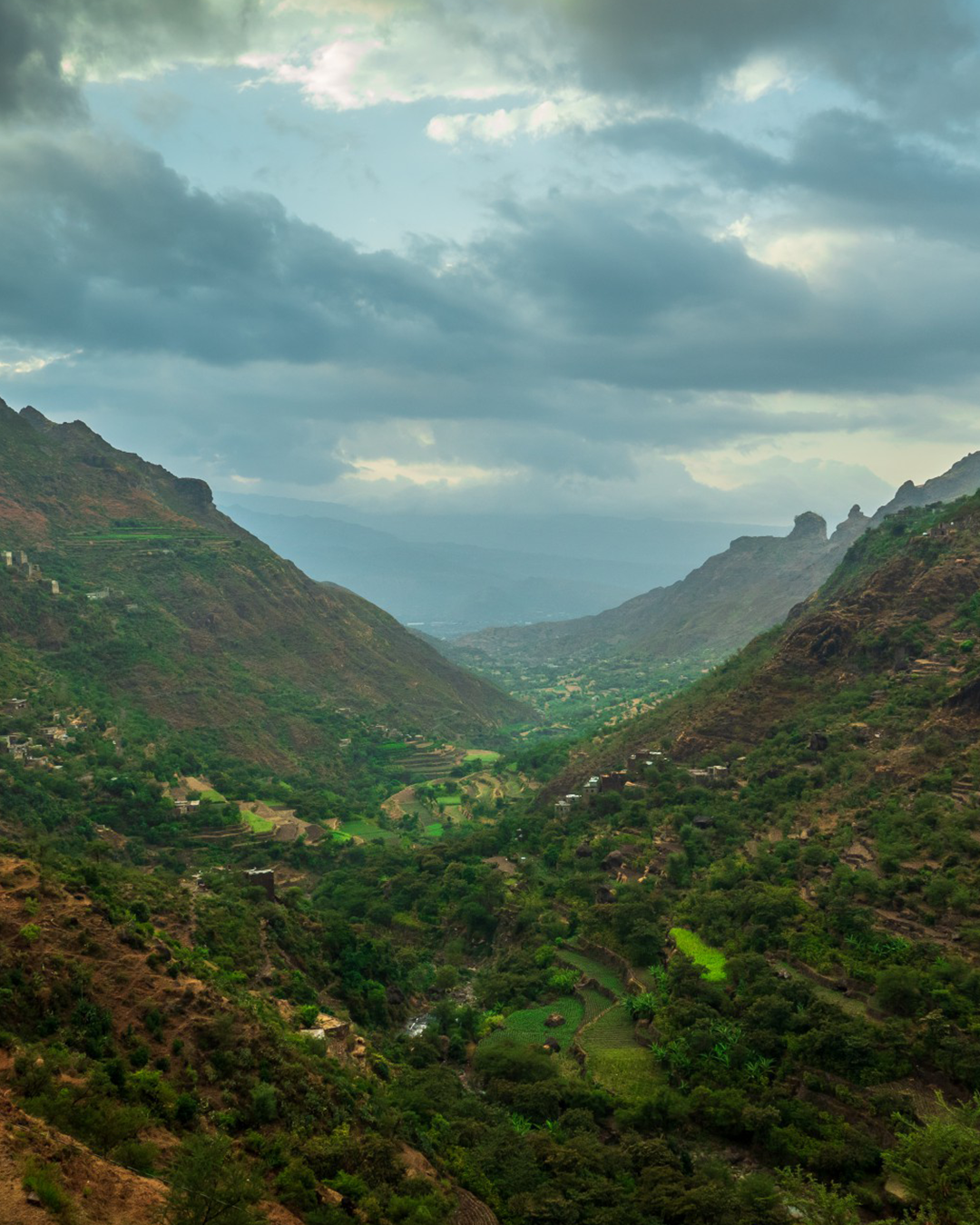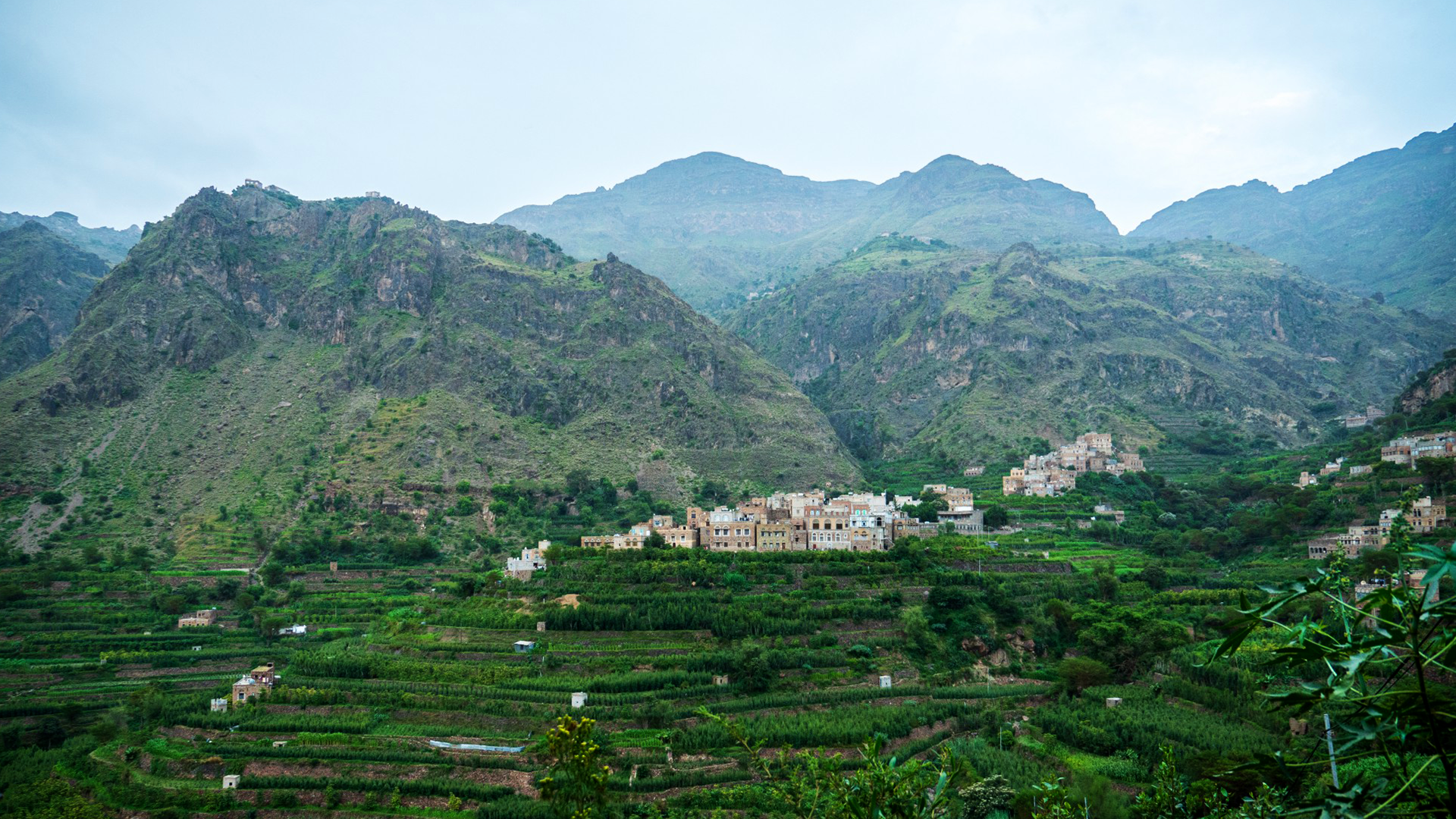wadi jannat
QIMA COFFEE X STANDART
ワディ・ジャナット
-
フレーバーノート:洋梨ソーダ、ホワイトティー、グリーングレープ、ハチミツ
プロセス:カーボニック・ハニー
品種:SL34
トレーサビリティ:ワディ・ジャナット < バダン < イブ < イエメン
標高:2,000 MASL
カテゴリー:コンペティション & 90+ シリーズPROCESS:
Carbonic HoneyGENETICS:
SL34TRACEABILITY:
Wadi Jannat < Ba'dan < Ibb < YemenALTITUDE:
2000 MASL -
イエメンで最も肥沃で歴史ある土地のひとつから届いた、コンペティショングレードのコーヒー。
「庭園の谷」を意味するワディ・ジャナットで栽培されたこのロットは、イエメンコーヒーのイメージを覆す存在です。紅茶のような構成に、きらめく酸味、凝縮した甘み、長く続くフローラルな余韻。200名を超える超小規模農家の収穫を束ねたこのロットは、土地と人々の忍耐の産物。高地のテロワール、ポストハーベストにおける革新、水資源の乏しさに立ち向かうレジリエンスが結びついた成果です。
このロットは、農業が根付くイエメン有数の肥沃地帯・イブ県バダン地域にある、山間のワディ・ジャナット村で栽培さ
A competition-grade coffee from one of Yemen’s most fertile and storied landscapes. Grown in Wadi Jannat - “the valley of gardens” - this lot challenges the perception of Yemeni coffee. Tea-like in structure, yet intensely sweet with a sparkling acidity and long floral finish.It’s a product of both place and perseverance: where high-elevation terroir meets innovation in post-harvest processing and resilience in the face of water scarcity. Cultivated in the remote village of Wadi Jannat, nestled in the Badan region of Ibb - one of Yemen’s most agriculturally rich areas - this lot reflects a farming culture deeply rooted in the land.
-
Qima Yemenの「コンペティション & 90+ シリーズ」は、名前の通り、イエメンが誇る最上級のマイクロ・ナノロットを集めたシリーズです。
比類なき品質とフレーバー特性を備えたこのシリーズは、イエメンの豊かなコーヒー遺産を称えるもの。
真に卓越した、世界レベルのコーヒー体験を求める方に最適です。Part of the The Qima Yemen Competition and 90+ Series, as its name suggests, this collection features the finest coffees Yemen has to offer, sourced from rare micro and nano lots. With exceptional quality and unmatched flavour profiles, this series is a true celebration of Yemen's rich coffee-growing legacy. Perfect for those seeking extraordinary, world-class coffee experiences
-
このロットは、Qimaがイエメンの水不足に適応するために開発した「カーボニック・ハニー」プロトコルに従って処理されています。
ワディ・ジャナットの200名を超える小規模農家が選別・手摘みしたチェリーは、Qimaの現地乾燥施設に集められます。そこで、密閉された二酸化炭素充満のタンクで嫌気性発酵が始まり、風味形成が促進されます。
その後、水を使わずに果肉除去(デパルピング)され、ミューシレージを残したまま、アフリカンベッドでゆっくりと乾燥されます。
豆は定期的に攪拌され、過発酵を防ぎながら均一な乾燥と風味の透明感を確保します。
乾燥工程では、水分値・密度・糖度(BRIX)を綿密にモニタリングし、品質と一貫性を確保していますThis lot undergoes Qima’s carbonic honey protocol—an innovative process adapted for Yemen’s water-scarce environment. After selective hand-harvesting by over 200 smallholder farmers in Wadi Jannat, cherries are delivered to Qima’s local drying facility.
There, they are fermented in sealed, CO₂-rich tanks to initiate anaerobic breakdown and flavour development. Cherries are then depulped without water, leaving the sticky mucilage intact. The mucilage-covered beans are dried slowly on raised beds and turned regularly to ensure even drying, prevent over-fermentation, and preserve clarity.
Moisture, density, and BRIX levels are closely monitored throughout to ensure quality and consistency.
-
ワディ・ジャナット
「ジャナット(庭園)の谷」という名の通り、ワディ・ジャナットはイブ県バダン山脈の東側斜面にある標高2,000m超の高地の村です。
肥沃な火山性土壌、年間を通じた降雨、冷涼で穏やかな気候という理想的な環境に恵まれており、高品質なコーヒー栽培に最適な土地です。
農家は代々の農耕知識を持つだけでなく、教育水準も高く、伝統的な方法と実験的なアプローチを融合させてカップ品質の向上に努めています。
コーヒーは、トウモロコシ、小麦、季節の果物などと混植され、レジリエンスと生物多様性を備えたエコシステムの中で育まれています。
バダン(Ba'dan)
バダンは、イブ県でも最も農業が盛んな地域のひとつであり、険しい段々畑、肥沃な渓谷、豊富な降雨で知られています。年間を通して気候は穏やかで、標高は2,500mを超える地点も存在します。
Qimaは、この地域、特にワディ・ジャナットにおいて200名を超える小規模農家と協働し、栽培・収穫・精製の各段階で品質重視の取り組みを支援しています。
この地域のコーヒーは、伝統と革新、地域の知識とQimaのプロセス技術の融合によって生まれています。イブ(Ibb)
「肥沃の地」として知られるイブは、イエメンでも最も緑豊かな地域で、人口160万人を超える県です。
国内で3番目に大きな県であり、人口密度も高く、農業的にも歴史的にも重要な地域です。特に東部および中央高地では、農耕の伝統が深く根付いており、コーヒーはもちろん、果物、穀物、野菜など多彩な作物が生産されています。
コーヒーにおいても、標高・降雨量・肥沃な土壌という理想的な条件が揃っており、近年では特異なカッププロファイルや革新的な精製手法で注目を集めるようになっています。
WADI JANNAT
Wadi Jannat, meaning “the valley of gardens,” is a high-altitude village perched on the slopes of Badan Mountain, overlooking the city of Ibb from the east. Reaching elevations of up to 3,200 MASL, the village benefits from exceptionally fertile soils and a cool, temperate climate, making it ideal for growing coffee alongside a wide variety of fruits and crops.What sets Wadi Jannat apart is not only its landscape, but its people - many of the farmers here are university-educated and deeply committed to improving both yield and cup quality. Like much of Yemen’s highland coffee community, they combine deep-rooted agricultural tradition with an evolving focus on innovation and excellence.
BADAAN
Badan is one of the most renowned regions within the governorate of Ibb. It is known for its year-round mild weather, lush landscapes, and vibrant agricultural activity. The region is home to numerous villages - including Wadi Jannat - that share similar environmental and cultural characteristics.Qima Coffee partners with around 200 farmers across Badan, working to elevate quality through collaborative post-harvest practices. Here, coffee is grown alongside crops like corn, wheat, and a wide array of fruit and vegetables. The area’s rainfall, fertile soils, and high altitudes create ideal conditions for producing exceptional, high-scoring coffees.
IBB
Nicknamed “the fertile province,” Ibb is located in southern Yemen and is the country’s second-most densely populated governorate, home to over 1.6 million people. It is also the third-largest governorate by area.Ibb is rich in history and culture. The city of Ibb and the historic town of Jiblah once served as administrative and commercial hubs during the Ottoman Empire. Today, the region is known not just for its agricultural abundance, but for its universities, museums, cultural centers, and sports teams.
-
SL34は、もともとケニアで選抜されたブルボン系統の品種で、高標高への適応性、耐病性、カップクオリティに優れたバランスを持つことで知られています。
エレガントなフローラルさ、層のある酸味、構造のある甘みが特徴で、火山性土壌が豊かな冷涼な気候で特にそのポテンシャルを発揮します。
ワディ・ジャナットの標高2,000mという環境においては、その遺伝的背景とイエメン東部高地のテロワールが融合し、抜群の透明感と鮮やかさを表現しています。
SL34 is a Bourbon-line variety originally selected in Kenya for its resistance, cup quality, and adaptability to high altitudes. Known for its elegant florals, layered acidity, and structured sweetness, SL34 thrives in temperate climates with rich volcanic soils. At 2,000 masl in Wadi Jannat, the variety expresses itself with exceptional clarity and vibrancy, drawing from both its genetic lineage and the distinct terroir of Yemen’s eastern highlands.
-
内戦の最中である2016年、イエメンのコーヒー農家を支援する目的で設立されたQima Coffeeは、現在ではイエメン最大のスペシャルティコーヒー輸出業者であると同時に、イエメンで最も社会的影響力の大きい企業のひとつに成長しました。
設立当初は南中部イエメンのたった1つのコミュニティ・30軒の農家との協働から始まりましたが、現在では55のコミュニティ、約3,000名の小規模生産者と連携しています。
コーヒーのソーシング活動にとどまらず、イエメンにおけるコーヒーの遺伝的多様性の研究にも力を入れており、数々の学術論文も発表。2020年には、アラビカ種における新たな遺伝子群「イエメニア(Yemenia)」を発見し、その風味の複雑さと気候変動に対する耐性が世界中の生産者にとって新たな希望となっています。
Qimaは今後もイエメンの小規模生産者支援と、イノベーション・研究開発を通じて、過去・現在・未来においてイエメンが世界に誇る生産地であることを証明し続けていきます。
Set up in the midst of Yemen’s raging civil war, Qima Coffee was first established to serve Yemen’s coffee farmers in 2016 and has grown to become Yemen’s largest specialty coffee exporter, and one of the country’s most impactful social enterprises. Since launching, Qima has grown from working with 30 farmers in one community in south central Yemen to working with almost 3,000 smallholder farmers in 55 communities across Yemen’s coffee growing lands.Beyond coffee sourcing, Qima has invested significant resources into researching Yemen’s coffee genetic landscape and has published numerous scientific papers on the subject. In 2020, Qima announced the discovery of Yemenia, a previously unknown genetic group of the Arabica coffee species. The Yemenia genetic group has displayed unique and complex cup quality and significant potential for climate resilience - an attribute which may be of benefit for millions of farmers across the globe.
Qima continues to invest in Yemen’s smallholder farmer infrastructure and push the boundaries of innovation and R&D to reestablish Yemen’s reputation as a hugely significant coffee origin, for the past, present and future of the global coffee industry.
-
イエメンのコーヒーや、複雑なプロセスのコーヒーは、一般的に溶解性が高い傾向にあります。
ワディ・ジャナット・ビレッジはその両方の特徴を併せ持ち、豊かな風味を備えたロットです。
そうした特性を踏まえ、私たちはフラットベッド型ドリッパーを使い、浅めのベッド、やや低めの湯温、そしてやや短めの抽出時間で淹れることで、絹のような舌触り、紅茶のような質感、そしてこのロット特有の甘さがより際立つと感じています。
使用器具:Origamiドリッパー + フラットベッドペーパーフィルター
使用量:15g
挽き目:EK 9.5 / コマンダンテ 18〜19クリック(中細挽き)
抽出比率:1:16
湯温:90〜92℃
抽出方法:
– 40g注いでブルーミング(40〜45秒)
– 1湯目:外側に広めのスパイラルで100g注湯(合計140g)、30秒待機
– 2湯目:中央に小さめのスパイラルで50g注湯(合計190g)、35秒待機
– 3湯目:同様に中心へ50g注湯(合計240g)抽出時間:2:30〜2:40
Wadi Jannat Village / SL34 / Carbonic Honey
Yemeni coffees, and more processed coffees, tend to have a higher solubility. Wadi Jannat Village is a combination of both and has a lot of flavour to give. With this, we've found, faster brew times with a shallower bed depth and slightly cooler temperatures in a flat-bed brewer really enhance the silky, tea-like texture alongside the coffees sweetness that defines the lot.
Device: Origami + Flat Bed Paper Filter
Dose: 15g
Grind: EK 9.5 / C40 18–19 clicks (medium-fine)
Ratio: 1:16
Temp: 90–92°C
Method:
Bloom with 40g water, wait 40–45 sec
Pour 100g in wide outer spirals (total 140g), wait 30 sec
Pour 50g in tight central spirals (total 190g), wait 35 sec
Final 50g in same central motion (total 240g)
Brew Time: 2:30–2:40







